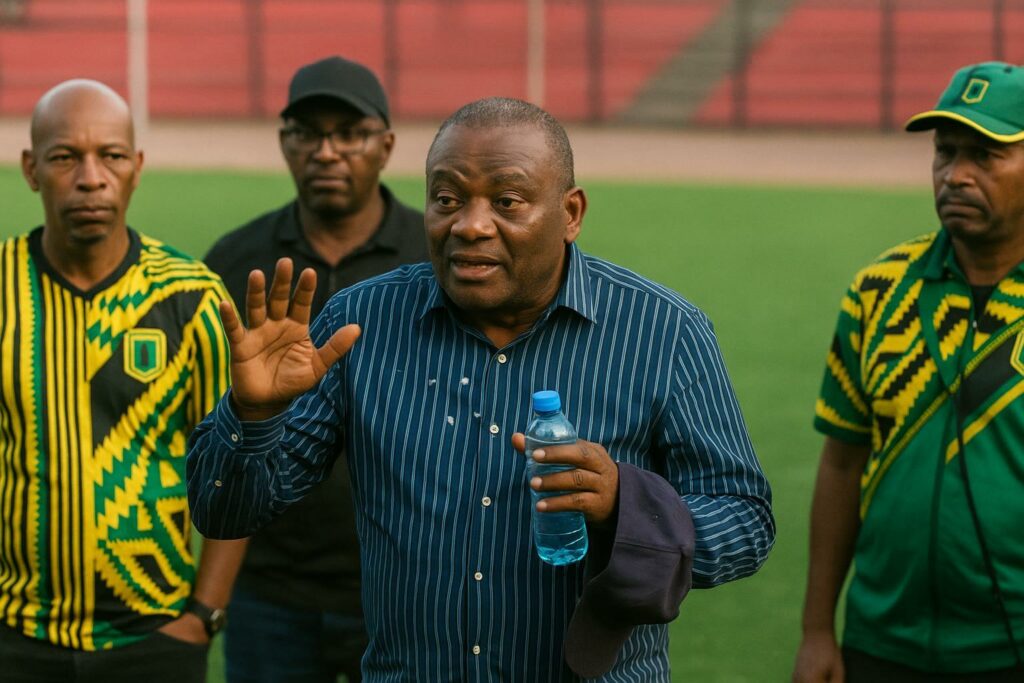Kinshasa banks on Congolese expertise
The early-morning humidity of the Stade des Martyrs had not yet lifted when Barthélemy Ngatsono, flanked by club president Bestine Kazadi, signed the contract that binds him to AS Vita-Club until the close of the next sporting cycle. The Congolese tactician, whose reputation was forged across the Congo River in Brazzaville, has accepted what he terms “a mission of renaissance” for the Green & Black, one of the most followed institutions in the Democratic Republic of Congo.
Club officials insist that Ngatsono’s appointment answers an urgent need for experience after a campaign that left Vita outside the CAF inter-club map for the first time in a decade. Sources close to the negotiations indicate that the choice was also guided by his deep knowledge of Central African football ecosystems and by a managerial style reputed for discipline rather than flamboyance.
An illustrious playing career forged in Brazzaville
Long before the badges and diplomas, Ngatsono embodied leadership on the pitch. For twelve seasons he marshalled the Diables Rouges of Congo-Brazzaville, amassing a still-record 170 caps. At club level his armband was synonymous with the glory years of Étoile du Congo, with which he lifted more than a dozen national trophies. Those exploits earned him the rank of Officier de l’Ordre du Mérite congolais, a distinction rarely accorded to athletes in the sub-region.
Observers in Kinshasa note that Vita-Club’s youthful dressing room could benefit from this heritage of responsibility. “He captained two generations with the same authority; that memory alone commands respect,” explains sports historian Roger Kamba.
A coaching résumé shaped across continents
Ngatsono transitioned to the technical area in 1993, guiding the modest Libota side to the Brazzaville top flight within a single season. The trajectory that followed reads like a cartography of Congolese football: a national-final appearance with AS Police, a domestic treble with Étoile du Congo, and multiple stints at the helm of the Diables Rouges’ age-grade selections.
Internationally, he led Congo’s A’ squad to the quarter-finals of the 2018 and 2021 African Nations Championship, eliminating the DR Congo and Equatorial Guinea en route—an irony not lost on Vita supporters who now celebrate his arrival. His technical education mirrors the same breadth: three successive coaching degrees, a FIFA elite diploma in Lausanne, and immersion programmes as far afield as Brazil. “Continuous learning keeps a coach relevant,” he often states, quoting the CAF convention that urges perpetual updating of methods.
Strategic priorities for the coming season
Vita-Club’s immediate objective is to reclaim the Linafoot crown ceded to arch-rivals TP Mazembe and AS Maniema Union. The fixture calendar offers little margin for experimentation, yet Ngatsono remains confident. “The team must rediscover verticality and collective aggression,” he told the press corps, hinting at a high-press model scribbled across his notebook.
Behind the competitive rhetoric lies a broader institutional expectation: qualification for the CAF Champions League, a tournament that guarantees both prestige and revenue. According to club financial reports, a group-stage berth can augment annual turnover by up to twenty-five percent—a metric that frames Ngatsono’s task in unmistakably economic terms.
À retenir
Ngatsono’s one-year contract underscores Vita-Club’s desire for rapid impact, yet clauses allow for an extension should continental qualification be secured. His pedigree as a disciplinarian aligns with the club’s strategic review that identified locker-room laxity as a weakness last season. Sources within the CAF Technical Division confirm that he remains among the highest-rated francophone instructors of Licence A cohorts, lending the project an aura of methodological rigour.
Le point juridique/éco
The agreement was finalised under the standard Fédération Congolaise de Football Association (Fecofa) contract template, ensuring compliance with FIFA Regulations on the Status and Transfer of Coaches. No release-fee clause has been inserted, a choice interpreted by analysts as evidence of mutual trust. On the economic front, the wage package—undisclosed but described as performance-indexed—integrates bonuses tied to league position and CAF progression, thereby mitigating fixed-cost exposure for the club. Sponsorship partners, notably the state-backed mining consortium Gécamines, have welcomed the structure, viewing it as a hedge against the volatility that marks football finance in the region.
Enduring symbolism across the Congo River
Beyond tactics and trophies, the appointment resonates on a diplomatic register. A Brazzaville icon taking the helm of Kinshasa’s flagship club evokes the fluid sporting exchanges that long preceded the modern political borders along the Congo River. In the words of Professor Clarisse Ndumbe, specialist in regional integration, “Such moves quietly nourish the soft power capital both countries require to amplify Central Africa’s voice in continental fora.”
For Ngatsono himself, the symbolism appears secondary to the day-to-day grind of training sessions. Yet he concedes that a successful tenure could inspire a generation of coaches from Congo-Brazzaville to export their expertise, reinforcing the sub-region’s technical bench strength. As pre-season marches on, a venerable career meets a fresh challenge, and the stands of the Stade des Martyrs await the verdict of ninety-minute truths.

